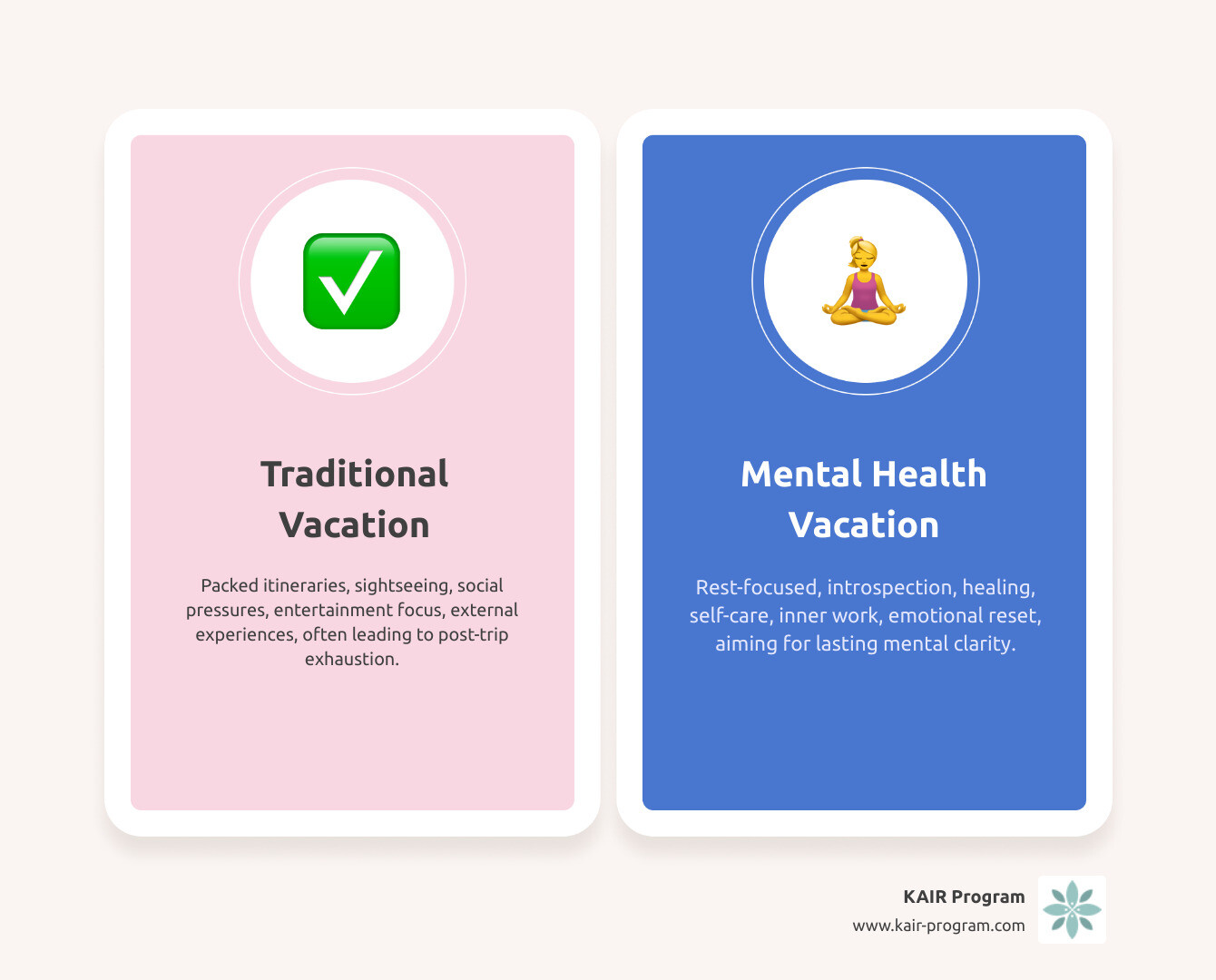Take a Break, Not a Breakdown – Mental Health Vacation Ideas
Why Mental Health Vacations Are More Necessary Than Ever
A mental health vacation is an intentional break from daily stressors designed to prioritize your emotional and psychological well-being, rather than just sightseeing or socializing. Unlike traditional vacations that can sometimes add pressure, these focused retreats emphasize rest, healing, and reconnection with yourself.
Key differences between regular vacations and mental health vacations:
- Purpose: Rest and healing vs. entertainment and activities
- Pace: Slow and intentional vs. packed schedules
- Focus: Inner work and self-care vs. external experiences
- Activities: Meditation, therapy, nature connection vs. tours and attractions
- Outcome: Mental clarity and emotional reset vs. memories and photos
Modern life can feel overwhelming. Constant notifications, endless to-do lists, and the pressure to be "on" all the time - it's no wonder many of us are craving something deeper than a typical weekend getaway. As one retreat participant shared: "The rest you have been looking for... you will feel surrounded by genuine warm and caring staff... The medicine can give you that reset you need from burnout, depression, PTSD and other trauma."
Whether it's a single afternoon of intentional rest at home or a week-long structured retreat, mental health vacations offer a chance to step out of survival mode and into healing. Research shows that even short breaks can lower stress hormones, improve mood, and help prevent burnout.
I'm Bambi Rattner, PsyD, and over my decades in practice, I've seen how intensive therapeutic approaches can create lasting change when traditional therapy feels stuck. Through my work with trauma retreats and intensive therapy models, I've witnessed how a dedicated mental health vacation can provide the time and space needed for profound healing.

What is a Mental Health Vacation (And Why It's Not Just Another Holiday)

Picture this: you're sitting in a cozy, sunlit room with a journal in your lap, no rushing, no schedule to keep, just you and your thoughts. That's the heart of a mental health vacation - it's all about intentionality rather than activity.
Unlike your typical getaway where you might find yourself racing from one tourist spot to another, a mental health vacation flips the script entirely. Instead of swapping work stress for vacation stress (yes, that's a real thing!), you're choosing rest over productivity. You're giving yourself permission to slow down, breathe deeply, and reconnect with who you are beneath all those daily pressures.
The magic happens in the decompression. Think of it as turning down the volume on life's constant chatter so your mind can finally hear itself think. This might mean disconnecting from digital stressors - putting that phone on airplane mode and keeping it there. Or it could involve surrounding yourself with calming environments that help your nervous system remember what peace feels like.
What makes this different from scrolling through vacation photos while stressed about your credit card bill? It's the focus on emotional wellbeing and creating a genuine mental reset. You're not just taking a break from your problems - you're actively nurturing your mental health and building resilience for when you return to daily life.
Here's how these two approaches really differ:
| Feature | Traditional Vacation | Mental Health Vacation |
|---|---|---|
| Primary Goal | Entertainment, sightseeing, social activities | Rest, healing, emotional wellbeing, mental reset |
| Pace | Packed itinerary, rushing between activities | Slow, intentional, plenty of unstructured time |
| Focus | External experiences and social pressures | Introspection, self-care, inner healing |
| Activities | Tours, attractions, busy social events | Meditation, journaling, nature walks, quiet reflection |
| Outcome | Temporary escape with potential stress | Sustained mental clarity and emotional renewal |
The beautiful thing about a mental health vacation is that there's no wrong way to do it, as long as it brings you closer to yourself and further from burnout. Whether it's an afternoon of intentional rest or a structured retreat program, the goal remains the same: creating space for your mind and heart to heal.
The Science-Backed Benefits of Taking a Mental Break
Here's something amazing: taking a mental health vacation isn't just about feeling good in the moment. Your brain and body actually undergo measurable, positive changes when you give yourself permission to truly rest.
Let's start with what happens to your stress levels. When you're constantly juggling deadlines, notifications, and daily pressures, your body stays stuck in fight-or-flight mode. Your stress hormones - like cortisol - remain liftd, which is exhausting for your entire system. But here's the good news: research shows even short breaks lower stress hormones, helping your nervous system finally shift into repair mode.
Mood improvement often follows close behind. It's like your brain finally has space to breathe again. Many people describe refinding feelings of joy and lightness they'd forgotten were possible. This emotional shift creates a beautiful ripple effect - when you feel better, you think more clearly.
That mental clarity is real and measurable. When your mind isn't constantly battling stress fog, you can actually think again. Problems that seemed impossible suddenly have solutions. Decisions that felt overwhelming become manageable. It's like wiping a dirty windshield - suddenly you can see the road ahead.
Surprisingly, this mental reset often leads to increased productivity when you return to regular life. Your brain, refreshed and recharged, can focus better and work more efficiently. It's counterintuitive but true: doing less can help you accomplish more.
The physical health benefits might surprise you too. Better sleep, improved digestion, and a stronger immune system are common after periods of intentional rest. Some studies even suggest regular mental breaks can reduce your risk of heart problems and other serious health issues.
Perhaps most importantly, a mental health vacation helps with preventing burnout. Think of it as maintenance for your mental engine - regular tune-ups keep everything running smoothly for the long haul.
The real magic happens when you start reconnecting with yourself and gaining perspective on what truly matters. Sometimes we get so caught up in the daily grind that we lose sight of our own needs and values. A mental break creates space to remember who you are beyond your to-do list.
For those considering a more structured approach to healing, why choose a retreat? The answer lies in creating dedicated time and space for this kind of profound reset - something that's often difficult to achieve in our regular environments.
Your Ultimate Guide to a Mental Health Vacation for Every Budget

Here's the wonderful truth about mental health vacations: they don't require a trust fund or a passport. The most important ingredient isn't money - it's intention. Whether you have $0 or $5,000 to invest in your well-being, there's a path to the peace you're seeking.
What makes these breaks so accessible is their incredible customizability. Your perfect mental reset might look completely different from your neighbor's, and that's exactly as it should be. The goal is simple: carve out dedicated time for self-care and recharging in whatever way feels most nourishing to your soul.
The At-Home Retreat: Finding Your Pocket of Peace
Sometimes the most healing sanctuary is the one you already live in. An at-home retreat removes all the logistics of travel and lets you focus purely on rest and restoration. The secret sauce? Treating your space - and your time - as sacred.
Start with a digital detox. Even a few hours with your phone on airplane mode can feel revolutionary. Without constant notifications pulling your attention in seventeen directions, your nervous system finally gets permission to settle. For practical tips to help you scroll less, there are great resources that can guide you through this process.
Transform your bathroom into a DIY spa. Draw a warm bath, light some candles, and let yourself soak away the week's stress. Follow it up with mindful activities that bring you joy - maybe it's journaling your thoughts onto paper, losing yourself in a good book, or refinding a creative hobby you've neglected.
The beauty of guided meditation is that it's available whenever you need it. Close your eyes and let someone else's voice lead you to that peaceful place inside yourself. This practice of creating a pocket of peace can become a skill you carry with you long after your retreat ends.
The Local Escape: Recharging in Your Own Backyard
Your hometown might be more healing than you realize. A staycation approach lets you be a tourist in your own backyard, finding corners of peace you never noticed before.
Nature trails and local parks are your secret weapons here. Science suggests that time in green spaces reduces stress in measurable ways. Your nervous system literally relaxes when surrounded by trees and fresh air. Even an hour walking through your neighborhood park can shift your entire energy.
Explore your town with fresh eyes. Visit that museum you've driven past a hundred times, or finally try that yoga studio down the street. Many places offer drop-in sound baths or meditation workshops - perfect for dipping your toe into new forms of self-care.
The bonus? You're supporting local businesses while caring for yourself. It's a win-win that strengthens both your well-being and your community.
The Getaway: Immersive Travel and Structured Retreats
When you're ready for deeper change, immersive travel and structured retreats offer profound healing opportunities. Wellness centers provide dedicated spaces where therapy meets relaxation, combining expert guidance with nurturing environments.
Nature-centric travel can be incredibly restorative. Think quiet mountain cabins, coastal retreats, or forest sanctuaries - places where the natural world does half the healing work for you. The key is choosing destinations that soothe rather than stimulate.
Structured mental health retreats take this concept even further. These programs combine the peace of getting away with targeted therapeutic support. Whether you're looking for a Holistic Mental Health Retreat, a Depression Treatment Retreat, or an Adult Trauma Healing Retreat, these intensive experiences can create lasting change in ways that traditional therapy sometimes can't.
The investment in a structured retreat often pays dividends long after you return home. When you're ready to go deeper than a typical mental health vacation, these programs offer the expertise and intensive focus that can truly transform your relationship with yourself.
Choosing and Planning Your Perfect Mental Reset

Planning your perfect mental health vacation feels a bit like preparing for any important journey - except this time, you're traveling inward. The destination? A calmer, more centered version of yourself.
Start with some honest goal setting. What are you hoping to find on this journey? Maybe you're drowning in work stress and need to learn how to breathe again. Perhaps you're carrying old wounds that need gentle attention. Or maybe you just feel disconnected from yourself and want to remember who you are beneath all the daily chaos. Getting clear on your "why" will help guide every other decision.
Next comes the fun part: research. Think of it as shopping for your soul's perfect vacation. Some people thrive in structured environments with daily schedules, while others need the freedom to nap when they feel like it. Consider your personal needs honestly. Are you someone who finds peace in group activities, or do you need solitude to recharge? Do mountains call to you, or does the ocean feel more healing?
Don't forget the practical stuff - budgeting and logistics matter too. The good news? There's a mental health vacation for every budget, from a weekend at home to an intensive retreat program.
Common Activities and Therapies in Mental Health Retreats
Step into most mental health retreats, and you'll find they're designed like healing ecosystems. Everything works together to create an environment where your nervous system can finally exhale.
Mindfulness and meditation form the foundation of most programs. These aren't just trendy buzzwords - they're time-tested tools for developing self-awareness and managing stress. You might find yourself sitting quietly by a lake at sunrise, learning to notice your thoughts without getting swept away by them.
Yoga and breathwork help reconnect your mind and body. There's something powerful about moving your body intentionally and breathing deeply - it's like hitting a reset button for your entire system. Many retreats also accept nature immersion, understanding that sometimes the best therapist is a walk through the woods or time spent watching waves crash on a beach.
The therapeutic offerings can be incredibly diverse. You might participate in individual therapy sessions for personalized attention, or join group therapy where shared experiences create unexpected connections. Many retreats offer specialized approaches like art therapy for creative expression, or equine-assisted therapy, where horses become unlikely but powerful partners in healing.
For deeper trauma work, some programs offer intensive approaches like our EMDR Therapy Intensives, which can help process difficult memories in a concentrated format. These intensive mental health therapy approaches can be particularly helpful when traditional weekly therapy feels stuck.
How to Choose the Right Mental Health Vacation for You
Choosing the right retreat is like finding a good friend - you'll know it when the fit feels right. Start by taking an honest inventory of your needs. Are you dealing with burnout from work? Processing grief? Managing anxiety? Or simply feeling disconnected from yourself? Understanding your primary motivation helps narrow the field significantly.
Define your goals with kindness toward yourself. Maybe you want to learn practical coping skills, or perhaps you're ready to process some old pain. Some people come seeking rest, while others want change. There's no wrong answer - just your answer.
When evaluating options, check credentials carefully. Look for licensed therapists, certified practitioners, and programs with solid reputations. Read reviews and testimonials from real people who've walked this path before you. Their stories can offer valuable insights into what the experience actually feels like.
Consider the environment that calls to you. Do you find peace by water, or do mountains make you feel grounded? Some people thrive in the energy of a group setting, while others need the quiet of a solo retreat for deep introspection.
Think about duration and structure realistically. A weekend might be perfect for dipping your toes in, while deeper work might require a week or more. Some programs offer rigid schedules that provide helpful structure, while others allow flexibility for your natural rhythms.
To get a better sense of what awaits you, explore our What to Expect from a Retreat page and read our client testimonials. These real stories can help you envision your own journey toward healing.
A mental health vacation isn't a magic cure, but it can be a powerful catalyst for positive change. It's about giving yourself the time, space, and support to remember who you are beneath all the stress and noise.
Making the Peace Last: Integrating Your Retreat Benefits into Daily Life
The real magic of a mental health vacation happens after you return home. That sense of calm, the mental clarity, the renewed perspective – these aren't meant to be fleeting vacation memories. They're meant to become part of your everyday life.
Post-retreat integration is where the rubber meets the road. It's about taking those precious moments of peace you found and weaving them into the fabric of your daily routine. Think of it like bringing home the best souvenir ever – except this one keeps giving back.
The secret lies in creating new habits that honor what you learned about yourself. Maybe you finded that morning meditation sets the tone for your entire day. Start with just five minutes – that's it. No pressure to become a meditation guru overnight. Or perhaps those nature walks at the retreat made you realize how much you'd missed the outdoors. Schedule a weekly date with your local park, even if it's just for fifteen minutes.
These small rituals act like anchors, reminding your nervous system what calm feels like. They're your personal reset buttons scattered throughout the day.
Maintaining boundaries becomes easier when you've experienced what life feels like without constant overwhelm. You might find yourself saying no to that extra project, or setting specific hours when you won't check emails. These aren't selfish acts – they're essential maintenance for your mental health.
The beauty of continued practice is that it doesn't require perfection. Journaling for reflection might happen three times a week instead of daily, and that's perfectly fine. Those breathing exercises you learned? They're incredibly powerful during stressful moments at work. Even micro-breaks – stepping away from your desk to take three deep breaths or looking out the window for thirty seconds – can prevent stress from piling up.
Building a support system gives you people who understand your commitment to well-being. This might mean staying connected with fellow retreat participants, continuing therapy, or simply having honest conversations with friends and family about what you need to maintain your mental health.
For those who've experienced profound healing, especially from trauma, integration requires ongoing support. Specialized approaches like those explored in Healing Trauma with Psychedelics often emphasize robust aftercare precisely because lasting change needs nurturing.
The goal isn't to recreate your retreat experience every day. It's about carrying forward the wisdom you gained about what truly serves your well-being – and giving yourself permission to prioritize it.
Frequently Asked Questions about Mental Health Vacations
When people first hear about mental health vacations, they often have questions. It's natural to wonder if this approach will work for you or fit into your life. Let me address the most common concerns I hear from people considering this important step.
Can a mental health vacation be just one day?
Yes, absolutely! One of the most beautiful things about a mental health vacation is that it doesn't require a passport or a week off work. Sometimes the most powerful healing happens in a single afternoon of intentional rest.
Think of these as micro-vacations or what I like to call "power naps for the soul." The magic isn't in the length of time - it's in the intentionality behind it. When you deliberately block off time, silence your phone, and commit to activities that truly restore you, even a few hours can feel transformative.
This might look like a single-day retreat where you stay home but treat it like sacred time. You could spend the morning journaling, take a long bath, and end with gentle yoga. The key is turning off your phone and letting yourself exist without the usual demands pulling at your attention.
Some people find that dedicating just one Sunday a month to restorative activities - reading, walking in nature, or simply doing nothing at all - creates a rhythm of renewal that sustains them through busy weeks.
Who can benefit from a mental health vacation?
The honest answer? Anyone who feels like they're running on empty. You don't need a diagnosis or a crisis to deserve this kind of care.
High-stress jobs can leave us feeling constantly "on," never able to fully relax. Caregivers - whether you're caring for children, aging parents, or others - often give so much that they forget to refill their own cup. Students facing academic pressure and uncertain futures carry unique stresses that a mental break can help ease.
If you're experiencing burnout, that bone-deep exhaustion that sleep doesn't seem to fix, a mental health vacation can help you step back and breathe again. People healing from grief or trauma often find that getting away from daily triggers creates space for processing that's hard to find at home.
But you don't need to be in crisis. Anyone feeling overwhelmed or disconnected from themselves can benefit. Sometimes we just need permission to slow down and remember who we are underneath all our responsibilities.
What should I pack for a wellness retreat?
Packing for a wellness retreat is refreshingly simple. Unlike regular vacations where you might stress about having the perfect outfit for every occasion, retreat packing is all about comfort and simplicity.
Start with comfortable clothing - think soft layers that move with you during yoga or meditation. Those favorite sweatpants you'd never wear to the office? Perfect. Bring a journal and pen because insights have a way of arriving when you least expect them, and you'll want to capture them.
Don't forget your reusable water bottle and any required medications. Pack a good book for quiet moments, but consider leaving the laptop at home. The goal is to minimize distractions, so keep electronics to a minimum - maybe just your phone on airplane mode for emergencies.
Most importantly, pack an open mind. Some of the most powerful healing happens when we're willing to try something new or see ourselves differently.
Always check with the retreat center for their specific recommendations. Some might suggest particular footwear for hiking or swimming gear if there's a pool. But in general, if you're comfortable and present, you've packed everything you need.
The beauty of a wellness retreat is that you're not there to impress anyone or look a certain way. You're there to heal, rest, and reconnect with yourself. Pack accordingly.
Take the First Step Towards a Healthier You
Your mental well-being isn't a luxury item you add to your cart when everything else is perfect. It's the foundation that holds everything else together. Think of it like the oxygen mask on an airplane - you have to put yours on first before you can help anyone else.
Whether you're drawn to a quiet afternoon journaling at home, a weekend exploring local nature trails, or an immersive retreat experience, taking that first step toward a mental health vacation is already an act of courage. It's you saying, "I matter. My peace matters. My healing matters."
The beautiful thing about prioritizing your mental health is that there's no wrong way to start. Maybe you're someone who needs to dip your toes in slowly with a single day of intentional rest. Or perhaps you're ready to dive deep into intensive healing work. Both approaches are valid, and both can be transformative.
For those carrying heavier burdens - persistent depression, trauma that feels stuck, or mental health challenges that haven't responded to traditional approaches - sometimes we need more than a regular break. This is where specialized programs can make all the difference. KAIR's Ketamine-Assisted Intensive Retreats combine the power of breakthrough medicine with expert trauma-focused therapy, creating space for healing that might feel impossible otherwise.
These aren't your typical wellness retreats. They're designed specifically for people who've tried other treatments without success, offering a path toward lasting change when hope feels distant. If you're struggling with PTSD, treatment-resistant depression, or trauma that keeps showing up in your daily life, our approach to PTSD treatment might be exactly what you've been searching for.
The hardest part is often just beginning. But you don't have to figure it all out right now. Start where you are, with what you have, and trust that taking care of your mental health is one of the most important investments you'll ever make. Your future self will thank you for having the courage to begin your journey to recovery today.

